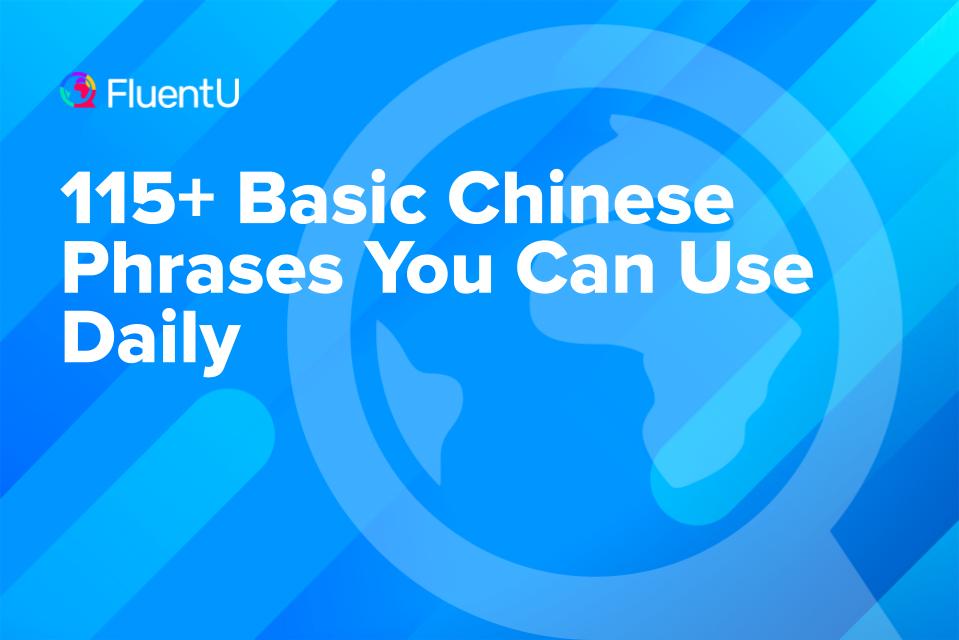Contents
- Chinese Greetings and Introductions
- Everyday Chinese Phrases
- Asking for Help in Chinese
- Chinese Small Talk Phrases
- Conversational Chinese Phrases
- Shopping Phrases in Chinese
- Eating Out and Restaurant Phrases in Chinese
- Travel and Transportation Phrases in Chinese
- Saying Goodbye in Chinese
- Why Memorize These Mandarin Phrases?
- And One More Thing...
115+ Basic Chinese Phrases You Can Use Daily

Imagine you’ve just met a native Chinese speaker and they’re trying to communicate with you in English.
Even if they’ve learned a lot about the structure of the English language, it’s not all that useful if they don’t know basic greetings in an English-speaking country. The same goes for you when you find yourself in a Chinese-speaking environment.
If you want to improve your speaking skills, here are over 115 useful phrases to facilitate communication with native Chinese speakers.
Download: This blog post is available as a convenient and portable PDF that you can take anywhere. Click here to get a copy. (Download)
Chinese Greetings and Introductions
- 你好。 (nǐ hǎo) — Hello
- 喂? (wéi) — Hello (when answering the phone)
- 你好吗?
(nǐ hǎo ma?) — How are you?
You can be a little more casual and a little cooler by adding a “Hey,” 诶 (ēi) at the beginning of your phrase. For example: 诶,你好。(ēi, nǐ hǎo.) — Hey, hello there.
- 早上好/早安。 (zǎo shàng hǎo/zǎo ān) — Good morning
- 下午好。 (xià wǔ hǎo) — Good afternoon
- 晚上好。 (wǎn shàng hǎo) — Good evening
- 你叫什么名字? (nǐ jiào shén me míng zì?) — What’s your name?
- 我叫…… (wǒ jiào…) — My name is…
- 您怎么称呼?
(nín zěn me chēng hū?) — How may I address you?
This phrase is a more formal/polite way to ask someone’s name.
- 请问您贵姓?
(qǐng wèn nín gùi xìng?) — May I ask your surname?
This phrase is even more formal and is used in business-like settings.
- 幸会。 (xìng huì.) — Nice to meet you.
Everyday Chinese Phrases
- 谢谢。 (xiè xie) — Thank you
- 不客气。 (bú kè qi) — You’re welcome
- 没关系。
(méi guān xi) — You’re welcome / It’s okay
A response to someone’s thanks, meaning there’s no need to feel grateful or apologetic.
- 对不起。 (duì bù qǐ) — Sorry / Excuse me
- 请问…… (qǐng wèn) — Excuse me
- 是。 (shì) — Yes
- 不是。 (bú shì) — No
- 是的。 (shì de) — That’s right / Yes
- 不是的。 (bú shì de) — That’s not right / No
- 借过一下。 (jiè guò yí xià.) — Please let me go through.
Asking for Help in Chinese
- 我听不懂。 (wǒ tīng bù dǒng)。 — I don’t understand,
- 不好意思,我中文说得不太好。 (bù hǎo yì si, wǒ zhōng wén shuō dé bú tài hǎo.) — Sorry, I don’t speak Chinese very well.
- 救命啊! (jìu mìng a!) — Help!
- 着火啦! (zháo huǒ la) — Fire!
- 停! (tíng!) — Stop!
- 叫警察! (jiào jǐng chá!) — Call the cops!
- 请帮帮我。 (qǐng bāng bāng wǒ) — Can you help me?
- 有人可以帮忙吗? (yǒu rén kě yǐ bāng máng ma?) — Can someone help me?
- 不好意思,我有一个问题。 (bù hǎo yì si, wǒ yǒu yí gè wèn tí.) — Excuse me, I have a question.
- 请你再说一遍。 (qǐng nǐ zài shuō yí biàn.) — Please say it again.
- 厕所在哪里?
(cè suǒ zài nǎ lǐ?) — Where’s the bathroom?
If you want to sound more polite or elegant, you could also use 洗手间 (xǐ shǒu jiān) instead of 厕所.
- 对不起,我迷路了。 (duì bù qǐ, wǒ mí lù le) — I’m sorry, I’m lost.
- 你会说英语吗? (nǐ huì shuō yīng yǔ ma?) — Do you speak English?
Chinese Small Talk Phrases
- 你是哪里人? (nǐ shì nǎ lǐ rén?) — Where are you from?
- 你是本地人吗?
(nǐ shì běn dì rén ma) — Are you a local?
In China, people in big cities often come from elsewhere. They move from smaller cities to the metropolis for work or study. Asking if they’re local opens up the conversation to talk about their hometowns.
- 你做什么样的工作? (nǐ zùo shén me yàng de gōng zùo?) — What kind of work do you do?
- 你的专长是什么? (nǐ de zhuān cháng shì shén me?) — What’s your specialization?
- 你读什么专业?
(nǐ dú shén me zhuān yè?) — What is your field of study?
Among students, you can ask about someone’s major, as a way to start a conversation.
- 你有什么爱好? (nǐ yǒu shén me ài hào?) — What are your hobbies?
- 你有兄弟姐妹吗? (nǐ yǒu xiōng dì jiě mèi ma?) — Do you have any siblings?
- 你最喜欢的电影是什么? (nǐ zuì xǐhuān de diàn yǐng shì shén me?) — What’s your favorite movie?
- 你喜欢哪种音乐? (nǐ xǐ huān nǎ zhǒng yīn yuè?) — What kind of music do you like?
- 你有什么推荐的书吗? (nǐ yǒu shénme tuī jiàn de shū ma?) — Do you have any book recommendations?
- 你最近好不好? (nǐ zuì jìn hǎo bù hǎo?) — How are you these days?
- 今天天气怎么样? (jīn tiān tiān qì zěn me yàng?) — How’s the weather today?
- 你吃了吗?
(nǐ chī le ma?) — Have you eaten?
This is the Chinese way of showing care and concern. Culturally, it’s almost the equivalent of “How are you?” Most people simply reply with 吃了 (chī le) or “I’ve eaten” in response.
- 诶,什么事? (ēi, shén me shì?) — So, what’s going on? (“What’s up?”)
Conversational Chinese Phrases
- 我明白了。 (wǒ míng bai le.) — I understand.
- 你说得对。 (nǐ shuō dé duì.) — You are right.
- 我不同意。 (wǒ bù tóng yì.) — I disagree.
- 你怎么看? (nǐ zěn me kàn?) — What do you think?
- 我有同样的感觉。 (wǒ yǒu tóng yàng de gǎnjué.) — I feel the same way.
- 你在开玩笑吧?! (nǐ zài kāi wán xiào ba) — Are you joking?
- 太酷了!
(tài kù le!) — That’s really cool!
The Chinese word for “cool” is a loanword from English.
- 好搞笑。 (hǎo gǎo xiào.) — That’s hilarious.
- 真的吗? (zhēn de ma?) — Really?
- 不会吧! (bú hùi ba!) — No way!
- 我的妈呀!
(wǒ de mā ya!) — Oh my goodness!
This phrase literally means “Oh my mother!”
- 哎呦我去!
(āi yōu wǒ qù!) — Oh my gosh!
This casual phrase translates literally as “Oh, I’m going!”
- 我也是。 (wǒ yě shì.) — Me too.
- 我理解。 (wǒ lǐ jiě.) — I understand.
- 太牛了! (tài niú le) — That’s freakin’ awesome!
Shopping Phrases in Chinese
- 请问有没有……?
(qǐng wèn yǒu méi yǒu …?) — Do you have…?
This phrase literally means “have or have not?” and precedes a noun.
- 多少钱? (duō shǎo qián?) — How much does it cost?
- 可以便宜点吗? (kě yǐ pián yí diǎn ma?) — Can you give me a discount?
- 我只是看看。 (wǒ zhǐ shì kàn kàn.) — I’m just looking around.
- 有其他颜色吗? (yǒu qí tā yán sè ma?) — Do you have other colors?
- 有我的尺码吗? (yǒu wǒ de chǐ mǎ ma?) — Do you have my size?
- 这个可以试穿吗? (zhè ge kě yǐ shì chuān ma?) — Can I try this on?
- 你们接受信用卡吗? (nǐ men jiē shòu xìn yòng kǎ ma?) — Do you accept credit cards?
- 我想买这个。 (wǒ xiǎng mǎi zhè ge.) — I would like to buy this.
- 请给我发票。 (qǐng gěi wǒ fā piào.) — Please give me a receipt.
- 这个可以退换吗? (zhè ge kě yǐ tuì huàn ma?) — Can I return or exchange this?
- 我可以看一下吗? (wǒ kě yǐ kàn yí xià ma?) — Can I have a look?
- 有保修吗? (yǒu bǎo xiū ma?) — Does it have a warranty?
- 这个打折吗? (zhè ge dǎ zhé ma?) — Is this item on sale?
- 我考虑一下。 (wǒ kǎo lǜ yí xià.) — I’ll consider it.
- 可以帮我包起来吗? (kě yǐ bāng wǒ bāo qǐ lái ma?) — Can you wrap it for me?
Eating Out and Restaurant Phrases in Chinese
- 你们有空桌吗? (nǐ men yǒu kōng zhuō ma?) — Do you have a table available?
- 我想预订。 (wǒ xiǎng yù dìng) — I would like to make a reservation.
- 我可以看看菜单吗? (wǒ kě yǐ kàn kàn cài dān ma?) — May I see the menu, please?
- 我们要点菜。 (wǒ men yào diǎn cài.) — We would like to order.
- 这个辣吗? (zhè ge là ma?) — Is this spicy?
- 请给我们来杯水。 (qǐng gěi wǒ men lái bēi shuǐ.) — Please bring us a glass of water.
- 我对海鲜过敏。 (wǒ duì hǎi xiān guò mǐn.) — I am allergic to seafood.
- 服务员,买单。 (fú wù yuán, mǎi dān.) — Waiter/waitress, the bill, please.
- 这个菜很好吃。 (zhè ge cài hěn hǎo chī.) — This dish is delicious.
- 这个菜是素食的吗? (zhè ge cài shì sù shí de ma?) — Is this dish vegetarian?
- 我想尝试当地特色菜。 (wǒ xiǎng cháng shì dāng dì tè sè cài.) — I want to try the local specialty.
- 这个餐厅有外卖服务吗? (zhè ge cān tīng yǒu wài mài fú wù ma?) — Does this restaurant offer takeout service?
- 这个菜适合几个人吃? (zhè ge cài shì hé jǐ gè rén chī?) — How many people does this dish serve?
Travel and Transportation Phrases in Chinese
- 我想去…… (wǒ xiǎng qù…) — I need/want to go to…
- 我要一张单程票 / 往返票。 (wǒ yào yì zhāng dān chéng piào / wǎng fǎn piào) — I want a one-way ticket / round-trip ticket.
- 这里怎么坐地铁 / 公交车? (zhè lǐ zěn me zuò dì tiě / gōng jiāo chē?) — How do I take the subway / bus here?
- 地铁站在哪里? (dì tiě zhàn zài nǎ lǐ?) — Where is the subway station?
- 公交车站在哪里? (gōng jiāo chē zhàn zài nǎ lǐ?) — Where is the bus stop?
- 飞机场在哪里? (fēi jī chǎng zài nǎ lǐ?) — Where is the airport?
- 坐地铁 / 公交车需要多少钱? (zuò dì tiě / gōng jiāo chē xū yào duō shǎo qián?) — How much is the fare for the subway / bus?
- 请在这儿停车。 (qǐng zài zhèr tíng chē) — Please stop here.
- 我要在这一站下车。 (wǒ yào zài zhè yī zhàn xià chē) — I want to get off at this stop.
- 车票在哪里买? (chē piào zài nǎ lǐ mǎi?) — Where can I buy tickets?
- 我要租一辆车。 (wǒ yào zū yí liàng chē) — I want to rent a car.
- 能给我一个地图吗? (néng gěi wǒ yí gè dì tú ma?) — Can you give me a map?
- 我需要打的 / 出租车。 (wǒ xū yào dǎ dī / chū zū chē) — I need a taxi.
Saying Goodbye in Chinese
- 再见! (zài jiàn!) — Goodbye!
- 拜拜! (bái bái!) — Bye-bye!
- 晚安。 (wǎn ān) — Good night
- 下次见。 (xià cì jiàn) — See you next time
- 回头见。 (huí tóu jiàn) — See you later
- 这是我的手机号码。 (zhè shì wǒ de shǒu jī hào mǎ。) — Here’s my cell number.
- 加我的微信吧。
(jiā wǒ de wēi xìn ba.) — Add me on WeChat.
WeChat is a popular social media site equivalent to Facebook or Twitter (which are both blocked in China).
- 回头见。 (húi tóu jiàn.) — See you later.
- 我们再联络吧。 (wǒ men zài lián lùo ba.) — Let’s keep in touch.
- 一帆风顺!
(yì fān fēng shùn!) — Have a good journey!
This is essentially the Chinese form of “Smooth sailing!” or “Safe travels!” and is used when a friend is leaving for a long time.
- 我先走了。下次再聊吧! (wǒ xiān zǒu le. xià cì zài liáo ba!) — I’ve got to go. Let’s talk again another time!
Why Memorize These Mandarin Phrases?
Learning any new language is a daunting prospect, but Chinese is especially difficult for many foreigners to learn. Mandarin Chinese is a tonal language, and features a complex writing system that requires the memorization of many different characters. If you’re diving into Chinese language studies, you might not be sure where to start.
That’s where memorizing common phrases comes in. By learning just a handful of common phrases, you’re giving yourself a head start. Even without a more robust vocabulary, you’re suddenly awarded the ability to communicate, even if it’s on a very basic level.
Learning set phrases also gives you a leg up in perfecting Chinese pronunciation. Pronunciation plays a very important role in Chinese, and using the wrong tone for a word can turn it into a completely different word. The phrases in this post use 拼音 (pīnyīn), a system of romanization that was developed to help foreign speakers use the correct pronunciation. In addition, you can click on any phrase in this post to hear it pronounced.
Learning these phrases is just the beginning. Use them as a jumping-off point to continue your studies and expand your knowledge of Mandarin Chinese. Take the next step in your studies with the help of a language learning program like FluentU. This authentic-video-based program can help you see the words from these phrases in new and realistic contexts.
FluentU takes authentic videos—like music videos, movie trailers, news and inspiring talks—and turns them into personalized language learning lessons.
You can try FluentU for free for 2 weeks. Check out the website or download the iOS app or Android app.
P.S. Click here to take advantage of our current sale! (Expires at the end of this month.)
Mandarin Chinese can be tough, but remembering some run-of-the-mill phrases does help while you learn the structure of the language.
Just putting forth the effort to cram in these phrases and using them while traveling is an admirable venture.
Download: This blog post is available as a convenient and portable PDF that you can take anywhere. Click here to get a copy. (Download)
And One More Thing...
If you want to continue learning Chinese with interactive and authentic Chinese content, then you'll love FluentU.
FluentU naturally eases you into learning Chinese language. Native Chinese content comes within reach, and you'll learn Chinese as it's spoken in real life.
FluentU has a wide range of contemporary videos—like dramas, TV shows, commercials and music videos.
FluentU brings these native Chinese videos within reach via interactive captions. You can tap on any word to instantly look it up. All words have carefully written definitions and examples that will help you understand how a word is used. Tap to add words you'd like to review to a vocab list.
FluentU's Learn Mode turns every video into a language learning lesson. You can always swipe left or right to see more examples for the word you're learning.
The best part is that FluentU always keeps track of your vocabulary. It customizes quizzes to focus on areas that need attention and reminds you when it’s time to review what you’ve learned. You have a 100% personalized experience.
Start using the FluentU website on your computer or tablet or, better yet, download the FluentU app from the iTunes or Google Play store. Click here to take advantage of our current sale! (Expires at the end of this month.)





















